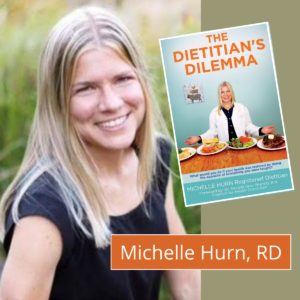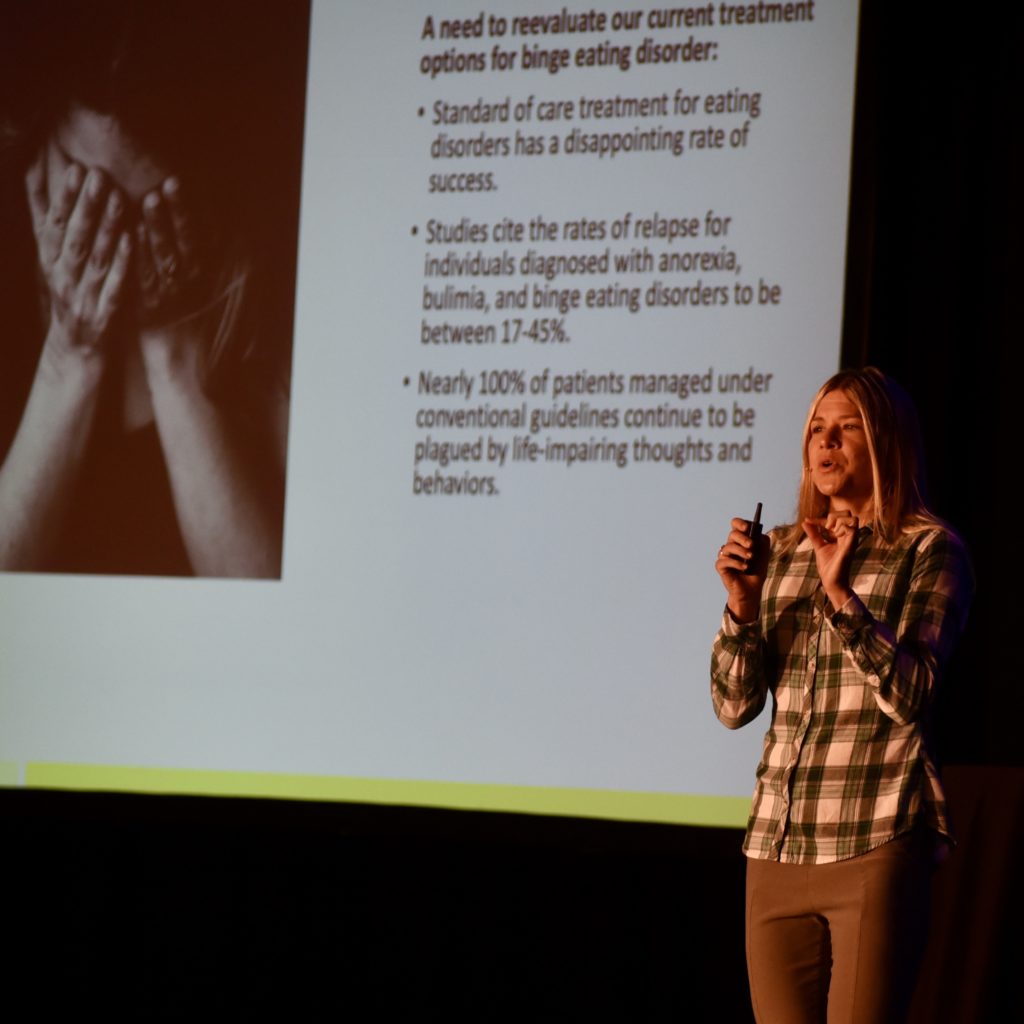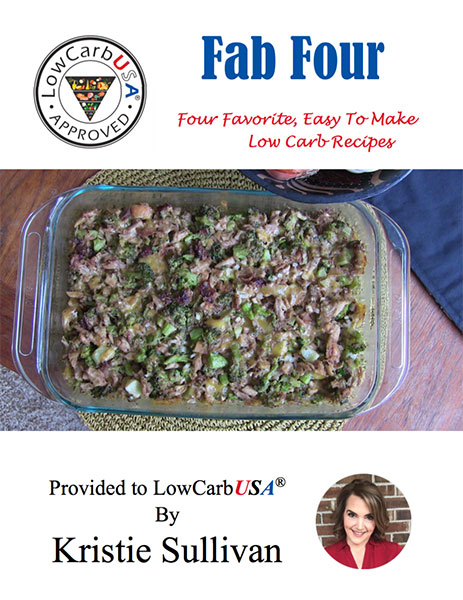Michelle Hurn, author of The Dietitian’s Dilemma, to speak at 2022 Low Carb Boca Conference
 Last November, Michelle Hurn ran for six straight hours and covered 44.63 miles in an ultra-distance race in Las Vegas, easily taking first place with an average pace of 8:03 per mile.
Last November, Michelle Hurn ran for six straight hours and covered 44.63 miles in an ultra-distance race in Las Vegas, easily taking first place with an average pace of 8:03 per mile.
Anyone watching who didn’t know Michelle’s inside story would have found it difficult to imagine that only a few years ago she was so sick and in the throes of anxiety and depression, that the idea of running even a mile would have been the furthest thing from her mind.
At the recent 2021 Low Carb San Diego Conference, Michelle, who is a registered dietitian, talked about her recent ultra-distance running success and how she used therapeutic carbohydrate restriction to overcome a wide range of serious medical problems that had squashed her hopes of one day qualifying for the Olympic trials in the marathon, and left her wondering if she would ever run again.
She also talked about the eating disorder that left her weighing 57 ½ pounds and close to death, when she was just 12 years old.
Michelle’s own personal experiences and frustrations with the mainstream medical and nutrition system led her to write a book entitled The Dietitian’s Dilemma. In the book, Michelle tells her heart wrenching story, and asks important questions about why our nation’s collective health is failing, and why the nutrition guidelines aren’t helping.
Anorexia and a Near-Death Experience
“When I was 12, at a weight of 57 ½ pounds, I heard a doctor tell my parents I had a 10% chance to survive, and that if I did survive, the likelihood of normal growth and development, and being able to run and play like the other kids would be very unlikely. And I remember being grateful, thinking thank God, this is almost over.”
Michelle talked about her experience overcoming those long odds, both in her book and during her presentation at the Low Carb San Diego Conference this past August.
She decided to pursue a career as a dietitian with the hopes that she could use those experiences to help others.
“I know what it’s like to suffer,” she said. “I know what it’s like to be in the throes of anxiety and depression struggling with an eating disorder. I’ve been very open about having a self injury and to be able to come out the other side.”
2022 Low Carb Boca Conference
Michelle will be presenting at the upcoming 2022 Low Carb Boca Conference, to be held January 14-16, and is in the process of narrowing down her topic to one of two possible areas.
One possibility is a talk that looks at some of the worst mistakes dietitians as a group have made, and the problems that have resulted. “This is not about blaming,” she said, “but some of the advice we’re giving really has the potential to be very harmful. One of the specific things I would look at is the high-carbohydrate diets being given to those with diabetes.”
Michelle is also considering talking about whether low carbohydrate diets pose a risk for those with eating disorders. “My hypothesis is that a low-carb diet can actually be quite liberating. I’m looking into whether there is enough evidence to talk about a ketogenic diet for anorexia, bulimia, or binge eating disorders.”
Register by November 30 and save 10% on tickets and CME/CMHE credits with code Less10.
The Dietitian’s Dilemma
Once Michelle learned about the power of therapeutic carbohydrate restriction, she started to question many of the guidelines and policies that she was required to follow in her role as a dietitian.
“I’ve seen people who have congestive heart failure be fed 144 grams of carbohydrates for breakfast,” she said. “Patients can basically get unlimited carbs, as long as the sodium is under 800 milligrams and saturated fat is under 25 grams. And in the psychiatric facility patients were getting over 42 teaspoons of sugar a day.”
She realized the food patients were being fed was contributing to their poor health.
“I would bring up the fact that we had patients gaining weight and their diabetes was getting worse, but you’re not allowed to talk about keto or low carb. It’s considered dangerous. It’s considered a fad. I was told that you have to teach the guidelines or you could be in violation of your license. I actually did get suspended twice for telling a diabetic I thought a low-carb diet was an option they should pursue or at least look into.”
The experience left Michelle feeling cynical and angry, and ultimately led her to write the book, The Dietitian’s Dilemma.
“We live in a capitalist society, and if I cure you of your diabetes, or if I prevent you from getting kidney disease, I lose you as a customer, right? So I can’t kill you, but I can’t heal you–I have to keep you perpetually sick. That’s how we make money.”
“When I first wrote the book, I was really angry, and I had very little optimism.” she recalled. “Over time I’ve started to see some reasons for optimism, though. In 2019, the American Diabetes Association finally said ‘Oh, hey, we think this low carb thing might have some credibility,’ and in the Virta study we’re seeing people who have reversed or controlled their diabetes, and they’re losing weight without calorie restriction, which I think is huge.”
Michelle also points to countless anecdotal instances in which she’s seen people restore their health using carbohydrate restriction.
“I’ve witnessed so many people reverse, you name it, everything from anxiety, depression, joint pain, arthritis, and osteoarthritis, to obesity and diabetes.
“I continue to believe it’s going to be very difficult to make changes at the top, and I’m not sure that will happen in my lifetime,” said Michelle. “I hope it does. But I continue to believe if we can advocate on a grassroots level, we can continue to spread the word out like this, I think that’s going to be our best way to slowly change the world.”
Michelle envisions a day when clinicians are given enough time to treat patients with the individualized care they need. That’s often impossible, she said, in the five or 10 minutes allotted for each patient.
“It’s heartbreaking because I often would have people start to talk to me and tell me, you know, things about their life and traumas and I literally didn’t have the time, which is terrible, and the opposite of what we really want.”
She also lamented that the nutritional education she was able to provide was a sheet of paper devoted to a “heart healthy diet”, which really wasn’t heart healthy.
“You can’t use a cookie cutter approach because the single mom with three kids who works two jobs is very different than say a young kid who’s overweight. Everybody has a little different situation. Everybody has different motivation, different food preferences, different levels of education, finances, and those things take time to talk about and address. It’s impossible to do it in five minutes.”
Michelle now uses her expertise in nutrition and in distance running to provide private coaching, primarily via Zoom.
Clinical Guidelines, Standard of Care, and the SMHP
“I’ve never met a health care provider that doesn’t want to do good,” Michelle said. “That’s why we go into this profession, right? We care, we want to do good, but you’re basically given these guidelines that aren’t working.”
“You get to the point where you realize this doesn’t work. This doesn’t make sense. This isn’t helping anybody.”
Michelle said she is enthusiastic about the work being done by the Society of Metabolic Health Practitioners (SMHP), and looks forward to seeing the organization’s Clinical Guidelines embraced by practitioners across the country and beyond.
“I get contacted two or three times a week by dieticians or doctors who tell me they feel they’re not adequately helping people and that they feel like they’re kind of stuck in this system,” Michelle said. “Having these evidence-based guidelines will allow them to know there is research behind this, and feel comfortable using it in their practice. When people see that they work, it’s going to start to have that ripple effect.”
Michelle said she is supportive of the SMHP’s Accreditation process, and may try to pursue accreditation in the future.

Michelle Hurn delivers a presentation at the 2021 Low Carb San Diego Conference.
A Message of Hope
In spite of the challenges facing those trying to achieve and maintain good metabolic health, Michelle is encouraged by the resilience and healing capacity most people possess.
“The body and the brain have a tremendous capacity to heal when we provide the right nutrition and when we remove the nutrition that may be less than ideal,” she said. “Long-term healing is multifaceted we know we need to work through trauma, but it would be my ultimate hope that somebody would look at me and realize that healing is possible, recovery is possible.”
“I don’t believe most people are going to recover by following the Standard American Diet, or by trying the ‘all foods in moderation’ nonsense. I do believe if you want a truly vibrant life, it’s there for you.”
Michelle believes most people struggling with metabolic health and/or obesity could see significant improvements in less than a month if they had access to the right information and guidance.
“The very first thing I would say to someone who is struggling is ‘I hear you. I’m sorry our system is set up so poorly, and you’ve likely been given terrible advice.’”
“One really nice thing about low carb is it can work relatively quickly. In 30 days their life will likely look totally different.“
Can Athletes Succeed on a Low-Carb Diet?
One frequent criticism of low-carbohydrate diets is that they interfere with athletic performance, something Michelle believes is completely overblown.
“I think that we’re making a very big mistake when we fail to distinguish between elite level marathoners and the other 99 percent of the population,” she said.
“The body is very good at oxidizing fat and using fat for fuel, and the more you become fat adapted, the better your body becomes at burning fat, even at faster paces. I’ve been doing this long enough now that I’m oxidizing quite a bit of fat and I don’t need carbohydrates, even when I’m getting closer to those maximum heart rates.”
When asked if she could run her best marathon ever without carbs, she responded, “Maybe not, but I can tell you that for most people, it’s really ideal to burn body fat versus complex carbohydrates. It’s going to allow you to recover better because you’re not constantly having those blood sugar spikes.”
Michelle, who is coached by Zach Bitter, the former 100-mile and 12-hour world record holder, said she has run up to 25 or 30 miles fasted. Zach also employs a low-carb diet as part of his training.
Michelle said some of the myths surrounding athletic performance and low-carb diets are a result of simple misunderstandings.
“I have people tell me they tried low carb and it was terrible, and when I ask them how long they tried it, they tell me they tried it for like a week and a half. It takes longer than that to get fat adapted. I think it would be helpful to get some basic information out there and empower people to try this, because I think it can be a game changer, not only for health, but in running performance.
Michelle is grateful that therapeutic carbohydrate restriction has given her another chance to enjoy success with distance running.
“It was just such a moment of gratitude to finish that six-hour race. Everything came full circle, from being so sick and thinking I wasn’t able to run again, to realizing I just won this race.”
Michelle said she is thrilled with her progress, but added that she is trying to avoid putting too much pressure on herself..
“Zach is a great coach and we’ve got a few goals for 2022 and 2023. As long as I’m in love with it, and as long as it’s going well, I’m just gonna keep on after it.”
Michelle, who was a presenter at the extremely successful 2021 Low Carb San Diego Conference, said she is looking forward to the opportunity to again meet people in-person in at the upcoming 2022 Low Carb Boca Conference. and is also excited to reach people around the world through the conference’s virtual component. Michelle said she believes conferences such as this are valuable on several levels.
“Practitioners and laypeople gain access to information and knowledge about nutrition and health they may have never been aware of before. These conferences are uplifting and inspiring,” she added. “Getting to network and have the opportunity to be around like-minded people is priceless.”
If you’re interested in hearing Michelle Hurn’s presentation at the upcoming 2022 Low Carb Boca Conference, be sure to visit the event page. The conference will be held live and in-person, but virtual options are also available, and will also have all replays and recordings available after for an unlimited time!
Register by November 30 and save 10% on tickets and CME/CMHE credits with code Less10. In-person tickets include spectacular low-carb dinners on Friday and Saturday night, and provide attendees with additional opportunities to meet and converse with presenters and other attendees.

